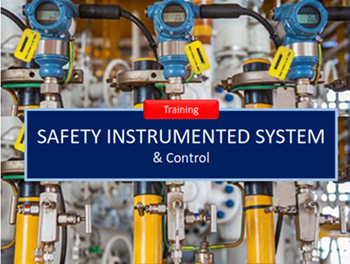
- This event has passed.
Safety Instrumented System (SIS) and Control

Background & About the Course
Process safety is a critical element in industries involving high-risk operations, such as oil and gas, petrochemicals, and manufacturing. A key component of process safety management is the Safety Instrumented System (SIS), which is designed to protect personnel, the environment, and assets from potential incidents that could lead to significant losses.
This training aims to provide an in-depth understanding of the design, implementation, and management of SIS in accordance with international standards such as IEC 61508 and IEC 61511. Participants will learn basic concepts, risk analysis, Layer of Protection Analysis (LOPA) management, and system testing to ensure the reliability and integrity of SIS in daily operations.
Course Objectives
- Expand practical knowledge in the design and application of Safety Instrumented Systems (SIS) in industrial processes.
- Understand the latest standards governing each stage of the safety life cycle, from initial hazard evaluation to detailed engineering and maintenance of SIS.
- Develop the ability to reduce risks and mitigate hazard consequences, and design, implement, operate, and maintain SIS to meet requirements.
- Assist companies in implementing functional safety measures that conform to international standards.
- Design, implement, and manage SIS while adhering to international standards such as IEC 61508 and IEC 61511.
Who Should Attend
This training is recommended for:
- Instrumentation and control engineers and technicians
- Design, installation, and maintenance engineers and technicians in process industries
- Managers and sales professionals employed by end users
- Systems integrators or consultants
- Consulting electrical engineers
- Plant engineers and instrument technicians
- Operations Technicians
- Electrical maintenance technicians and supervisors
- Instrumentation and control system engineers
- Process control engineers
- Mechanical engineers
- Procurement professionals
Course Content
- Fundamental of Safety Instrumented System (SIS)
- Differences Between SIS and Other Control Systems
- Review of Basic SIS (IEC 61508, IEC 61511, and ISA S84)
- Functional Safety
- Safety Life Cycle
- Risk Reduction
- Layers of Protection Analysis (LOPA)
- Conceptual Design
- Reliability Analysis
- Safety in Field Instruments & Devices
- Analyzing Risks
- Assessing the Need for Risk Reduction
- Safety Requirements Specifications
- Fault Tree Analysis
- Safety Integrity Level (SIL)
- Hardware Fault Tolerance
- Failure Rate
- Technology Choices
- Performance Requirements
- Implementation of SIS
- API RP 754 (Process Safety Performance Indicators)
About the Course Leader
Prof. Endra Joelianto, Ir., Ph.D., SMIEEE
Prof. Endra Joelianto, Ir., Ph.D., SMIEEE, is a leading expert in control engineering with research focusing on Hybrid Control Systems, Discrete Event Control Systems, Petri Nets, Robust PID Controllers, and Industrial Automation using PLC/DCS. He earned his Engineering Physics degree from ITB in 1990 and a PhD in Control Engineering from The Australian National University in 2001. Prof. Endra coordinates Intelligent Control and Automation at ITB and founded the PLC Research Group and Schneider-OMRON PLC Training Center, fostering collaboration with Schneider Electric, OMRON Corporation, and Invensys WONDERWARE.
He has led national retooling projects and participated in professional training on PLC, DCS, and calibration across Asia and Africa. As an instructor, he provides training in instrumentation and process control to universities and major companies in the petrochemical, oil and gas, and manufacturing sectors, including PERTAMINA, British Petroleum, and PT. Pupuk Kalimantan Timur. His contributions have significantly advanced industrial automation and education in Indonesia.
